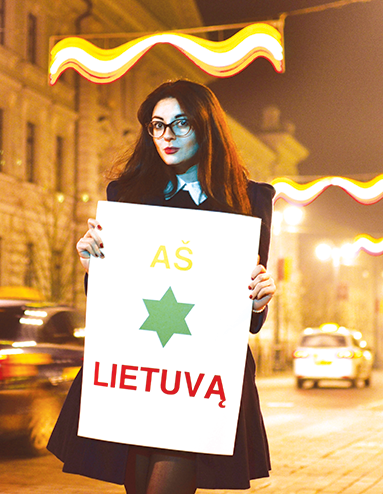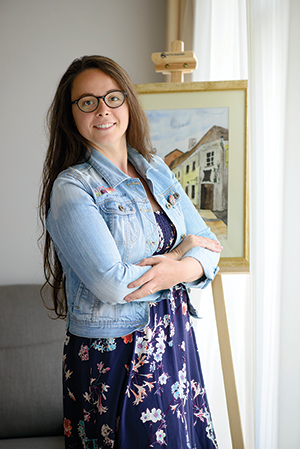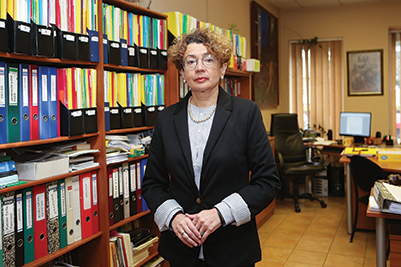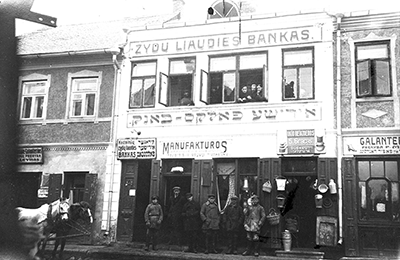Wider World
Feature
Keeping the Faith in Vilnius

Amit Belaite adores the long ode to the city of Vilna that was penned by writer and poet Moyshe Kulbak 90 years ago. Lines from the poem about Vilna’s stones and streets were running through her head on a warm summer afternoon as she led a walking tour through the narrow, winding streets of the city now known as Vilnius, the capital of the small Baltic nation of Lithuania.
Belaite, 23, heads the Lithuanian Union of Jewish Students. When she posted the announcement for the group’s tour of Jewish Vilnius, she expected a couple of dozen people to be interested. To her amazement, 400 signed up, many of them non-Jews.
“People know the city is rich in Jewish history,” she said. “They feel a big need to learn about it.”
To accommodate the large number of participants, Belaite ran the tour twice. She began at the Jewish Culture and Information Center, located inside the former Vilna Ghetto, and included stops along Zydu Gatve (Jewish Street), with its distinctive old archway, and Gaon Gatve, named for the towering 18th-century rabbi known as the Vilna Gaon, who helped the city earn the moniker “the Jerusalem of the North.” Also included were commemorative plaques in both Lithuanian and Yiddish that mark the spots where Jewish publishing houses, libraries, schools, theaters and synagogues once stood.
Before World War II, these streets were thronged with Jews, who lived alongside Poles, Russians, Germans and Lithuanians in relative harmony. Ninety percent of Lithuania’s prewar Jewish population of 220,000 perished during the Holocaust. After the war, nearly half a century of Soviet rule took a further toll on Jewish culture. In the 1970’s, most of Lithuania’s Jews chose to immigrate to Israel or the West.

Today, Lithuania is home to only 4,000 Jews. Yet Belaite and other women in Lithuania’s small Jewish community are working hard not only to preserve their Jewish heritage but to share it with members of the non-Jewish majority.
The tour was an important bridge-builder, noted Belaite. “When people touch part of Jewish history,” she said, “they feel a personal connection. It breaks down stereotypes.”
Growing up, Belaite attended public school with only a handful of Jewish students and was conscious of being a member of a small minority. “I never hid that I was Jewish,” she said; her “strange” first name, brown eyes and dark hair made it obvious (most Lithuanians are fair). Back then, most of her friends were non-Jews and she dated non-Jewish boys. But when she finished high school and became a student of public health at Vilnius University, she began to strengthen her Jewish identity. At Jewish summer camp and community events, Belaite learned “the basics—prayers, the rules of kashrut, what to do on Shabbes and the holidays.” And when she discovered the Jewish students organization, she jumped at the chance to help it grow. Today, it has more than 600 members.
“I want to help the community survive,” she said.
Like Belaite, Sofija Pavinskaite, 31, felt little connection to her Jewish heritage as a child. She wore a pair of Star of David earrings, but that was about it. “I grew up absolutely Lithuanian,” she said. As she entered adulthood, though, she began seeking out her Jewish roots. She attended lectures and movies with her mother, Elena. And as her attachment to Jewish culture and religious observance grew stronger, she decided to abandon a law career and become a teacher at the Sholom Aleichem ORT Gymnasium, the only Jewish school in Vilnius. “Little by little,” she said, “my Jewish identity is transforming.”
Pavinskaite teaches art and history at the school, which was founded in 1989 during the waning days of the Soviet era and now has more than 300 students. It is directed by Misha Jakobas, the son of a Holocaust survivor who “knows all the students by name,” she said.

On Friday nights, Pavinskaite lights candles with her mother. On holidays, she attends the Choral Synagogue, which has been holding services since the 1990’s. It is the only active synagogue out of a previous 100 in the city. She also coaches swim teams for the local branch of Maccabi, the international Jewish sports league, and helps run a Jewish summer camp.
One summer, Pavinskaite enrolled in an intensive program at the Vilnius Yiddish Institute at Vilnius University. Yiddish “was the main language of Lithuanian Jews, the language that my own family used to speak,” she said. “Because of the Holocaust, my family is not big. Almost everyone was killed. For me, Yiddish is a bridge to the family I lost.”
Many of Belaite’s family members perished during the Holocaust, too. “My grandfather was left all alone in the world at 18,” she said. Yet this painful history was not much discussed when she was growing up. “I’m the first who can talk about it.”
To cope with her acute sense of loss, Belaite has worked hard to connect herself and others to the Shoah. She organized a gathering for Jewish students at Vilnius’s Holocaust museum, known as the Green House. She was a featured speaker at the annual March of the Living at Ponar, a notorious Holocaust killing site near Vilnius. (Earlier this year, an expedition discovered an underground tunnel made by Jewish prisoners to escape Ponar on April 15, 1944, the last night of Passover.) She attended a ceremony to honor the “righteous gentiles” who helped her grandmother survive. “If there were more righteous,” she said, echoing Pavinskaite, “maybe I’d have cousins and a big family.”
Both Belaite and Pavinskaite are regulars at events sponsored by the Jewish Community of Lithuania, which has branches in seven cities, including Kaunas, Siauliai and Panevezys (traditionally known to Jews as Kovne, Shavl and Ponevezh).
Faina Kukliansky, 61, was elected chair of the Jewish community in 2013. In that capacity, she manages a wide range of social services, clubs and cultural programs for all ages, from retirees who remember the days when Vilnius was the capital of Yiddishland to preschoolers experiencing their first taste of challah.

“It is thrilling to be heirs to such a magnificent,world-famous Jewish community,” she said, “and to be able to walk the streets in the footsteps of one of the most creative Jewish communities” of the past.
A former practicing lawyer and the daughter of Holocaust survivors, Kukliansky has no illusions about the challenges of sustaining a vibrant Jewish presence in a land nearly devoid of Jews. “We are a tiny remnant,” she said, but “we want to work hard to maximize what we can so that we can together build a community that 100 years from now will be more substantial than it is today.”
Among Kukliansky’s initiatives is Bagel Shop, located in the Jewish community building on Vilnius’s bustling Pylimo Gatve. Staffed by young Lithuanians who are seeking to deepen their engagement with their country’s Jewish heritage, it offers educational programs, a newsletter—and bagels.
“The Jewish community is not only for Jews,” Kukliansky said. “It’s for the whole society.”
Each year, Bagel Shop holds an awards ceremony to honor artists, educators and activists who advance the cause of tolerance in Lithuania. In 2015, Belaite was among the winners.
Observers have measured increased anti-Semitic incidents throughout Europe, yet these women do not perceive a worsening atmosphere in Lithuania. “I don’t feel that in my surroundings,” Pavinskaite said. Belaite agrees. “I’ve never been mistreated because I’m Jewish,” she said.
“Anti-Semitic stereotypes do exist,” Kukliansky said. On occasion, Jewish cemeteries and other sites are defaced, and anti-Jewish sentiment is common on the Internet. Nonetheless, she said, “we do not have to deal with it in government institutions or on the streets. This is not something we face on a daily basis.”
Alongside local programs like Bagel Shop and Belaite’s walking tour, Lithuania’s government has acted to support Jewish remembrance. The government has won praise for allocating $50 million in restitution funds to compensate the community for its losses in the Shoah. Public schools are required to teach about the Holocaust, and high schools are encouraged to join a network of 100 tolerance centers run by the International Commission for the Evaluation of the Crimes of the Nazi and Soviet Occupation Regimes.
Yet the picture is not all rosy. The government has been criticized for actions and inactions deemed insensitive to Jews, including the failure to prosecute Nazi criminals and the honoring of some who took action against Jews during the Holocaust.
When Lithuania celebrated the 25th anniversary of its declaration of independence from the Soviet Union in the spring of 2015, Kukliansky and other members of the Jewish community joined a controversial march down the main boulevard in Vilnius. The march drew people of all political persuasions, including right-wing nationalists whose slogan is “Lithuania for the Lithuanians.”
When Belaite marched, she carried a handmade poster that said “I [Star of David] Lithuania.”
“I wanted to send the message,” she said, “that we Jews are part of a multicultural Lithuania and we are proud to be Litvaks,” the traditional term for Lithuanian Jews.
What does the future hold for Jews in Lithuania? Will young people raise their families here? Belaite and Pavinskaite say they plan to remain in their native country.
“I grew up here,” Belaite said. “This is my home.” If she has children, she is determined to share her heritage with them. “I will tell them all the stories I have,” she said. “I’m a Litvak. If they are here, they will be Litvaks, too. I want them to be patriots of their country, to know the history, good and bad, to learn the traditions.”
Pavinskaite makes frequent visits to Israel to see her grandparents, who made aliyah in 1991, but she has no plans to emigrate. “It is good to live here,” she said.
Kukliansky hopes that young Jewish women like Belaite and Pavinskaite will, indeed, make their lives in Lithuania and will continue to be active leaders in the community.
“Lithuania is quite welcoming today for Jews,” she said, “despite what happened in the war. We have all the conditions necessary to develop the Jewish community.” Kukliansky believes Lithuania’s Jewish community will survive and grow.
“We close our eyes and smile inside,” she said, “and don’t listen when people say we are finished. We just roll up our sleeves and get to work on new projects to keep alive the spirit and ethos of our community.”
Ellen Cassedy is the author of We Are Here: Memories of the Lithuanian Holocaust (University of Nebraska Press). Her website is ellencassedy.com.








 Facebook
Facebook Instagram
Instagram Twitter
Twitter
Ellen Epstein says
We just returned from fabulous trip to Vilnius. We did many of these things with a wonderful tour guide but I would have loved to have seen this article before we left. We were also in Mariampole, the birthplace of mystery father-in-law. We tried to findtried to you, Ellen, since we have your book but were told you were out of the country. Yasher Koach on this wonderful article.
Ellen Epstein says
Should have said “late father-in-law”. Don’t know how the word “mystery”got in my note. Sorry.
Eric Mack says
The Choral Synagogue is not the only place in Vilnius for Jewish prayer. Chabad, led by
Boston-born Rabbi Sholom Ber Krinsky and his wife, offers Shabbat davening and meals and provides other programs.
Marcia Gruss Levinsohn says
yasher koakh, Ellen. You have been using your time soo well, You are doing such great research and writing, Thank you for keeping me informed. My father, “a likhtikn gan eydn zol er hobn,” was born in Kovna guberna and was proud to be a “litvaker”. He was an itinerant rabbi and decided he did not wish to bring up a family in a place with so much prejudice. In189? he took a ship to New York, where he worked various jobs and saved his earnings to enable him to bring his parents and siblings to this “goldene medina.”
Rona Schneider says
You aren’t able to amazing. Thank you for keeping the Litvak legacy alive. Are ancestors are thinking of you and thanking you. Rona Schneider
Bonnie Salminis says
My Family is planning a trip to Kaunas, Palanga, Plunge in early December. Would you have any info on a guide we may use. We will only be there from 12/8 to 12/11. If not could you give me info on how to find a guide.
Libby Barnea says
Unfortunately we do not have any direct knowledge of travel guides. Perhaps reach out to the Lithuanian Jewish community? http://www.lzb.lt/en/
Vilnius says
Great article! I’m happy that people find Lithuania interesting or return to their roots. Have a great time here guys! You can visit Anykščiai it’s a beautiful place at any time…